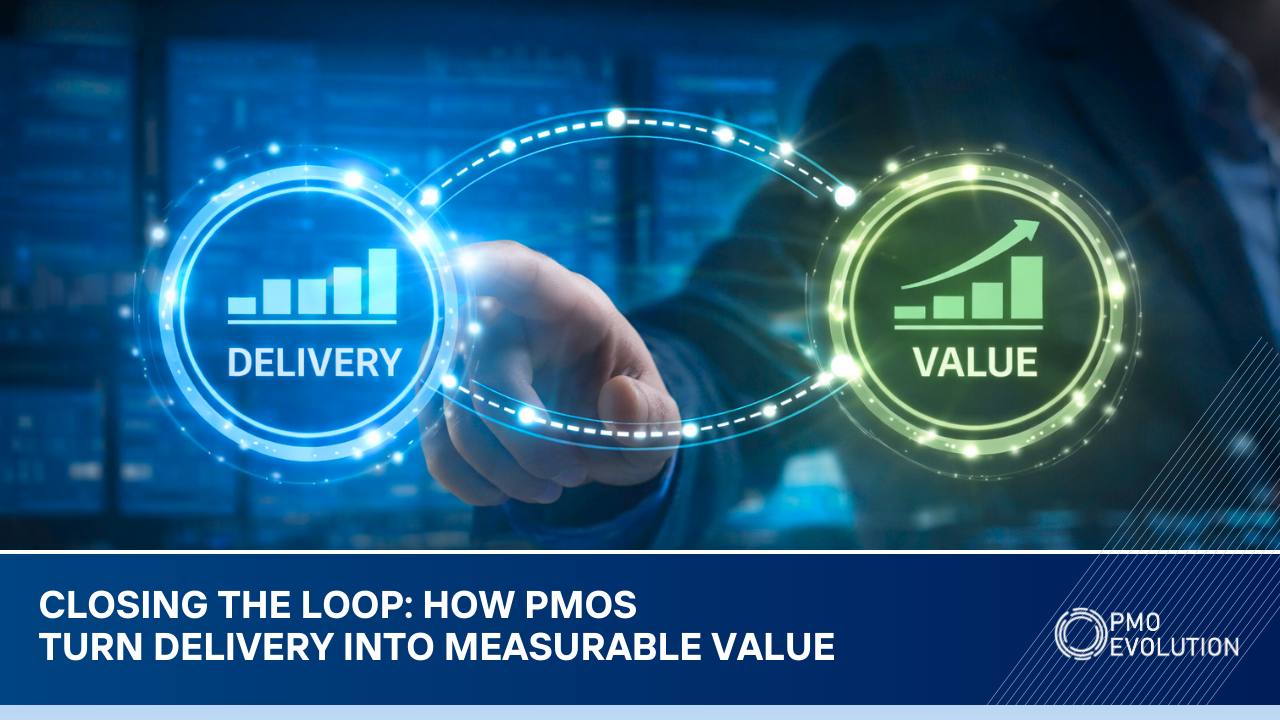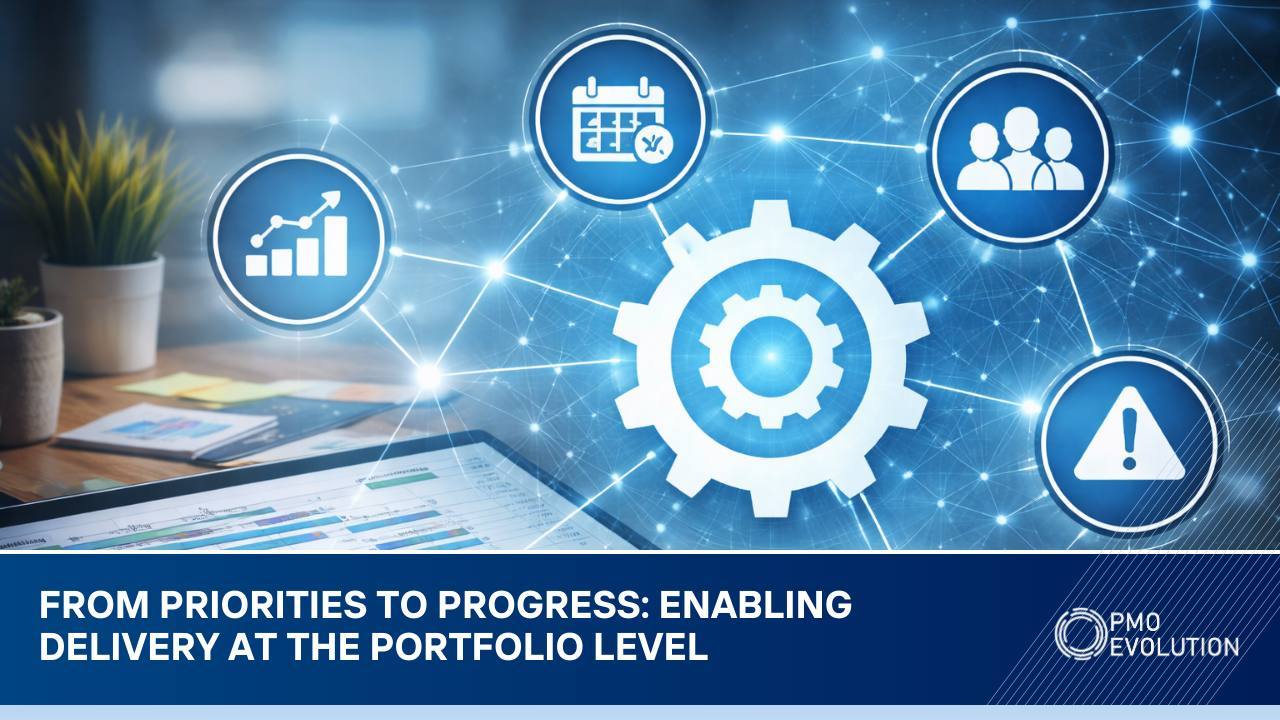The PMO Value Dilemma — From Reporting Factory to Strategic Partner
I’ve sat in too many executive meetings where the PMO update is met with polite nods, or worse, impatient glances at the clock. The team worked hard, compiled dashboards, assembled slides, and delivered the report. But when the CFO or COO asks, “So what’s the impact on revenue, costs, or customers?” the room falls silent.
That silence is where the PMO value dilemma lives.
We believe we’re adding value by providing visibility and structure. Executives often see something different: a reporting factory that consumes resources but doesn’t move the business forward. And if we stay in that box, we’ll never be seen as strategic partners.
Why PMOs Struggle with Perception
This isn’t a problem of bad intentions. Most PMOs are created with good purpose: establish control, track progress, and improve predictability. But over time, the expectations calcify.
➤ Legacy DNA.
Many PMOs were designed to feed executives with status data. That design persists even as the business needs evolve.
➤ Comfort in reporting.
Dashboards, traffic lights, and status decks are safe. They’re tangible outputs. Leading strategic conversations feels riskier.
➤ Executive demand for quick answers.
Leaders often just want a red, yellow, or green summary. PMOs comply and stay in that transactional role.
The result: a perception gap. Inside the PMO, we see structure, governance, and transparency as value.
Outside, executives see overhead. A team that reports but doesn’t transform. This is why PMOs are often the first cut during budget pressures. If you’re viewed as a cost center, you’re always one CFO question away from extinction.
The Cost of Staying in the “Reporting Factory” Box
The risks are real and I’ve seen them play out:
1. Budget Cuts. When finance looks for “non-essential” functions, reporting factories are at the top of the list.
2. Loss of Influence. Without a seat at the strategy table, the PMO becomes an observer, not a driver.
3. Talent Drain. Team members don’t want to spend their careers building reports no one reads. They leave, and the PMO becomes harder to staff.
It’s not just about survival. It’s about relevance. A PMO that doesn’t evolve risks being replaced by agile coaches, portfolio analysts, or worse, left behind entirely as business units set up their own shadow processes.
Outputs vs. Outcomes: The Heart of the Shift
Here’s the truth: reports, dashboards, and compliance checks are outputs.
But executives don’t care about outputs. They care about outcomes.
 The difference may seem subtle, but it changes everything. Outputs tell executives what happened.
The difference may seem subtle, but it changes everything. Outputs tell executives what happened.
Outcomes tell them why it matters. When a PMO makes this shift, it stops being a factory of data and becomes a partner in business results.
A Framework for Shifting Conversations
So how do you move from outputs to outcomes?
I use a framework that any PMO, regardless of size, can adopt.
1. Start with Business Objectives
Every project status, every report, every dashboard should link directly to a business goal.
If you can’t answer “Which strategy does this enable?”, stop reporting it.
2. Translate Metrics into Value
Don’t just report that a project is on time. Explain what the timeline means in business terms.
“On track” → “We’ll hit the product launch window before competitors, protecting $20M in revenue.”
3. Audit Your Outputs
Take a hard look at every deliverable. If no one is acting on it, cut it. Time saved on useless reports can be redirected to conversations that matter.
4. Establish Business Impact Reviews
Move beyond status meetings. Hold quarterly sessions where the focus is:
→ What impact have we created?
→ Where have we missed the mark?
→ What needs to change?
5. Train Your Team to Ask “So What?”
Every time someone produces a report, they should add a line: “So what does this mean for the business?” That single habit shifts mindset from activity to value.
The Organizational Realities You’ll Face
None of this is easy. Shifting perception is as much about politics as it is about process. Some executives are perfectly comfortable with the PMO in a reporting role. It’s neat. It’s predictable. It doesn’t challenge their decisions. The moment you step into strategic conversations, you may unsettle them and that’s part of the work.
Your team may resist too. Not everyone feels confident talking about ROI, benefits, or strategy. Those conversations require a different skill set and a willingness to be visible. It can feel safer to stay behind the dashboard, just reporting what’s already happened.
And you will be tested. The first time you reframe a conversation, someone will roll their eyes and say, “Just give me the traffic lights.” That’s your moment to stand firm, to explain why the conversation needs to be about impact, not just status.
This is why courage matters. You don’t reposition a PMO by waiting for permission you do it by showing a new kind of value executives didn’t know they needed until you put it in front of them. When PMOs make this shift, the difference is unmistakable. Executives start defending the PMO in budget discussions, not questioning its existence. Inside the team, morale lifts as people see themselves as contributors to strategy, not just administrators of process.
This is the transformation from being tolerated to being trusted and it’s exactly why the work is worth doing.
How We Help PMOs Make This Leap
Making this shift isn’t something most PMOs can do in isolation. When you’re buried in reporting cycles and fighting fires, it’s hard to step back and see where the PMO is stuck or to build the confidence and language to lead a different kind of conversation.
That’s where we come in. At JBF Consulting, we help PMO leaders do three critical things:
- Diagnose the current state — We pinpoint where the PMO is functioning as a reporting factory and where value signals are being lost.
- Build a maturity roadmap — We use proven frameworks to create a practical plan for evolving from output-focused to outcome-driven.
- Coach leaders and teams — We equip PMO leaders and their teams with the tools and language to shift executive conversations and demonstrate measurable business impact.
If you’re ready to reposition your PMO as a true value creator, let’s talk. Our consulting team has helped PMOs of every size make this leap through diagnostics, maturity frameworks, and leadership coaching.
Book a call with us if you’re ready to start that transformation and put your PMO on the path to becoming a true strategic partner.
And Subscribe to my newsletter here for grounded strategies and practical tools you can use right away whether your PMO has 3 people or 300.







